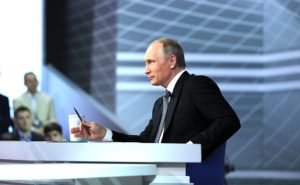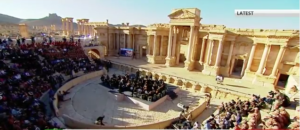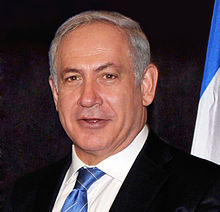The usual U.S. depiction of Russian media is that all you get is Kremlin propaganda, but prime-time talk shows actually offer wider diversity of opinion and more substantive debates than what appears on American TV, says Gilbert Doctorow.
By Gilbert Doctorow
I remember with a shudder an exchange I had with Elmar Brok on March 5, 2015, on The Network, a debate program of Euronews. Brok, a German and chairman of the European Parliament’s Committee on Foreign Affairs, comes from Angela Merkel’s CDU party and within the Parliament is in the European People’s Party bloc, on the center right, the bloc which really calls the shots in the Parliament.
Brok is big, brash and doesn’t hesitate to throw his weight around, especially when talking with someone outside the Establishment whom he has no reason to fear. We were discussing the shooting of Boris Nemtsov, which occurred just days before. Brok insisted the murder was the responsibility of Vladimir Putin, not that Putin had pulled the trigger but he had created the atmosphere where such things could happen, etc., etc.

Russian President Vladimir Putin answering questions from Russian citizens at his annual Q&A event on April 14, 2016. (Russian government photo)
One way or another the talk shifted to the allegedly autocratic nature of the Putin “regime,” with its crackdown on freedoms and, in particular, its ever tightening control of media. At that point, I objected that the Russia media were very diverse editorially, with many different points of view expressed freely.
Brok shot back that this was patently untrue, and he did not hesitate to cross all red lines and indulge in libel on air by asking how much the Kremlin paid me to say that. Apart from the obvious, that an authoritarian like MEP Brok would not know freedom of speech if he tripped on it, I think back to that exchange every week whenever I turn on Russian state television and watch one or another of the main political talk shows.
These shows are very popular with Russians and draw in audiences numbering tens of millions. The longest running is by veteran presenter Vladimir Soloviev. A competing show in this format on Pervy Kanal, the country’s flagship television station, is Special Correspondent hosted by a journalist 20 years Soloviev’s junior, Yevgeni Popov.
Now that I have just made my first appearance on Popov’s program (on May 11), I can state with full confidence that my impressions as a viewer are borne out by what I experienced as a participant: respect for diversity of opinion in a marketplace of ideas.
My landing on the program was the result of one of those chance encounters that have a core of pre-determination in them. I happened to be in the European Parliament auditorium in Brussels on April 26 — awaiting the screening of Andrei Nekrasov’s film on Bill Browder and the manufactured myth of Sergei Magnitsky’s murder — when Yevgeni and his Russian cameraman looked around the nearly empty room to find someone to comment on the film’s last-minute cancellation. They settled on me, I delivered the needed sound bite and we made contact.
My later article on the Mariinsky Symphony Orchestra concert in Palmyra, Syria, on May 5 was published at Consortiumnews, Russia Insider and other portals that Yevgeni’s staff monitor. So, when they had a talk show devoted to terrorism, the Islamic State and Western press reaction to the Mariinsky concert, I was identified as a welcome new face and got an email inviting me to their Moscow studio to join the “regulars” on Special Correspondent.
Talk Show Regulars
The regulars on these talk shows are a mix of Russians and foreigners, pro-Kremlin and anti-Kremlin voices. There inevitably is at least one American who can be counted on to purvey the Washington Narrative. A reliable regular in this category has been Michael Bohm, who was for a long time the op-ed manager at The Moscow Times and now is said to be teaching journalism in Moscow. On May 11, Bohm’s place was kept warm by another upstanding neocon, the bureau chief of The New York Post.
Then there is an Israeli regular who delivers the Netanyahu perspective on events. And you can be sure to see a Pole or Ukrainian who will spice up any discussion about the Maidan protests and the current regime in Kiev.
From among Russians, the talk show hosts bring in one or more representatives of opposition parties. On May 11, it happened to be a personality from the Yabloko Party (Liberals). But at other times there will be the leader of the Communist Party, Gennady Zyuganov, the founder of the right nationalist LDPR, Vladimir Zhirinovsky, or the leader of the social democratic party, Just Russia, Sergei Mironov. They all get their time on air in these shows.
For the pro-Kremlin position on May 11, we had a member of the Russian federal Security Council, a professor of television journalism from Moscow State University, a very loyal Vesti journalist and someone from a Moscow think tank.
There are those who will object that the anti-Kremlin foreigners who are invited time and again to speak out in the Russian political talk shows are selected precisely because they are so outrageous and/or appear so dim-witted that they serve the purposes of the official party line. There is some truth to this, although to rise to the level of self-caricature of Michael Bohm still takes extraordinary linguistic skills, which no doubt escapes the attention of Russian viewers.
But the Russian opposition leaders who are invited on air are a totally different story. They are shrewd observers of the Russian political system with deep resources of insider experience and analytical skills. With the Russian opposition voices, other factors are operative.
Firstly, their criticism of the Kremlin these days is almost exclusively on domestic policy; like the population in general, the opposition leaders who appear on state television have rallied around the flag in the face of economic warfare and information warfare deemed to be initiated by the West. Secondly, they are nearly all representatives of parties with seats in the Duma. The so-called “non-systemic” opposition figures, who could not pass the five-percent barrier of electoral support to enter the legislature, receive no or very limited air time on the talk shows.
From the standpoint of the authorities, these sometimes odious personalities will not be allowed to disseminate seditious views on state television. For instance, Mikhail Kasyanov, head of the Parnas party or movement where he shared power with Boris Nemtsov, has spent too much time paying court to the anti-Russian bloc of Guy Verhostadt in the European Parliament or visiting the Arizona home of Sen. John McCain in support of anti-Russian sanctions. Alexei Navalny effectively called for violent overthrow of the regime when he fired up the crowds on Bolotnaya Square on Dec. 5, 2011. It is hard to imagine any country where the authorities would hand them the microphone, least of all on prime time.
Into the Arena
The Russians are great fans of boxing or wrestling matches without rules, where almost anything goes. And the talk shows are often a free-for-all, especially if there is no particularly important politician among the panelists. In this spirit, each of us received a round of applause from the live audience as we entered the studio, like so many Roman gladiators on their way into the Coliseum.
But the presenter does keep order, and not just to ensure the breaks for advertising are respected. In this way, I was assured before we went on air that I did not have to shout down the regulars to be heard, as they often do among themselves, but would be given the mike when I indicated I wanted to jump in.

A Russian orchestra performing at Palmyra’s Roman theater on May 5, 2016. (Image from RT’s live-streaming of the event.)
I jumped in three times during the program, at greatest length when the discussion finally turned on what I had researched and wanted to share: my take on the Western media coverage of the Mariinsky’s concert in Palmyra.
Yevgeni Popov knew very well that what I was about to say was 180 degrees at variance with what he had said about this coverage in a broadcast several days earlier. His position was that the world at large viewed the Russian cultural mission to Palmyra with great sympathy. My position was and still is that the immediate PR return from Russia bringing 100 foreign journalists to the concert was very meager and largely negative.
To this I added that it is much too early to draw conclusions because Western media were similarly negative initially following Valery Gergiev’s concert in South Ossetia in August 2008 at the conclusion of the Russian-Georgian war, but that within six months the views changed in the West completely in Gergiev’s favor.
Popov let me have my say to the end, holding the others back. There was no question for me that his objective was to challenge his audience, not to coddle them. How nice it would be if U.S. prime-time television allowed similar rough-and-tumble – yet substantive – debates on foreign policy towards Russia and the rest of the world.
Gilbert Doctorow is the European Coordinator of The American Committee for East West Accord Ltd. His most recent book, Does Russia Have a Future? was published in August 2015. © Gilbert Doctorow, 2016


Drop of freedom in the see of dictatorship? You (Doctorov) can praze Hitler for perfect railrod schedule when riding to concentration camp.
Sorry for wrong spelling , Doctorow.
INSIDE RUSSIA???
Not exactly. But the contributions of Gilbert Doctoreau are
welcome additions to our ability to perceive Russia.
“Reserving the right to object”…as they say in Congress.
On a few points.
Thanks for your work.
—-Peter Loeb, Boston, MA, USA
Mass media and elections in the United States have been tightly controlled by economic concentrations for decades. The people do not have a democracy to fail, but a prehistoric tyranny of economic power.
The right wing never really believes the principles it claims: truth is not a factor in what its members must state as their beliefs. It waves the flag and praises the lord of whatever state it finds itself in, because it must do so to gain the advantages of the gang, and to avoid gang retribution.
The rest of the people are not allowed to say that they want democracy. H.L. Mencken put it,
“The average man …avoids the truth as diligently as he avoids arson, regicide or piracy on the high seas, and for the same reason: because he believes that it is dangerous, that no good can come of it, that it doesn’t pay.”
Even when sympathetic, the sheeple go along with the oligarchy and dump the problem on better citizens and damn them when that is inadequate. They can always pretend that personal benefit is “conservatism.”
The days of courageous patriotism are long gone. Americans are not stout enough to resist bullying, because they no longer live with forces of nature, but only the forces of money and totalitarianism. They will do nothing until they fear suffering themselves, when it will be too late for them. This will not change until the angry dispossessed are at their door, when the empty suit of armor that the US has become, the fortress of the rich, is toppled by its enemies.
PBS is the best: it typically brings in two or three persons from the Washington establishment, who slug it out whether Putin is a Hitler incarnate, a paedophile with $200B loot in some mysterious bank, and/or an apartment bomber in Russia. Knocking off (killing) opposition members then appears a minor offense compared to other vile crimes. A highly civilized discussion with respect for each others identical point of view, which regurgitates the same points that the establishment distributed earlier in the PR releases to their MSM.
Now what do you think is missing from the topical discussions in the US media and exists in the Russian ones? Did you notice from Dr Doctorow’s article: the Israel’s point of view. Why is this? Because no-one dares say in the Western MSM anything against Israel’s interest – there is simply no discussion in the Western MSM about Israel’s interest in any issue because Israel’s interest is the Western interest. Therefore, not only do Western MSM operate on a singular world view expressed by all talking heads then nobody dares digress from the path and express opinion non-conducive to Israel’s interest.
Finally, one off topic point on Western propaganda. It is about one now standard propaganda trick – when Russian planes fly in the international space and get intercepted by, say, the British fighters near the Baltics, the Western MSM say “intercepted over the Baltics” implying that the Russian planes breached the airspace of the three Baltic states and instead of flying in the international space in the geographic area of the Baltics. This is amplified by a statement of the supposed Russian aggression. On top, NATO is even terribly bothered by the Russian planes switching off their identification transponders. Switching off the transponder is exactly what the US spy plane did over the North Sea about two weeks ago when approaching the Russian airspace, but then the US complained of “unprofessional interception” by the Russian jets. Also, when the USS Donald Cook was buzzed by the unarmed Russian fighters in the International waters near the Russian Kaliningrad enclave, the fact that the ship was in the international waters at the time was repeated endlessly with every mention of the Russian aggressive behavior (should have been shot-down; losing one or even two jets in return for sinking a US destroyer would have been a very good chess move by Putin, thank you very much).
This kind of brainwashing of the domestic population to squeeze more money for the military is a daily staple of the Western MSM propaganda, which does not exist in the countries outside of US control. The US-Israeli MIC is truly unique in the World.
Kiza,
You mentioned the USS Donald Cook, but the USS Liberty is a story yet to be told. Also, the Adolf Eichmann trial should have never ben tried in Israel since Israel was not even a state a the time of the atrocities. Israel had no legal ground to put him on trial in that state and could only cherry pick some things from the Nüremberg trial led by the US. The history of Israel is bankrupt, and the furthest thing from a moral state one could imagine. The trial itself should show its fake legal precedence and disprove all of the legal arguments laid down in Nüremberg. Then throw in the USS Liberty and you have a state the US should never support.
They are the “pure” race, and I wonder where they got that idea? t’s not too difficult to understand sadly. Let them do their own bidding and own financing and keep the US out of such a morally bankrupt Ayran race. Next is the Golan Heights for some other false method presented to the world.
Western media has diversity. NeoCons and Humanitarian Bombers routinely slug it out on the Sunday morning shows.
Dr Doctorow,
I wonder what your take is re: our current discussion about the ‘evil empire’ (as if no one in the US has mirrors) in the ink press, and of course the ‘print-video talking heads reading off a teleprompter’ press. If one weren’t a published, tenured professor like Chomsky could the discussion even find a format in the press? It comes as no surprise to me how many are in fear of losing grants, jobs, government research money, and necessary equipment for experiments.
One has to tow the line, or lose the funding. Dr Doctorow, how extensive is this? I would feel it is rampant and another version of controlling the ‘message’ but I am open to another opinion. Thank you again for the article.
More substantive debates that what is on American TV? That’s easy to do. We set a pretty low bar in that way. Americans want to watch entertainment on TV– nothing else– so news was replaced by infotainment long ago.